Before we even start, I want to put this out there: technically every book is a mystery if you don’t know the ending. Which means the only non-mysteries are in the non-fiction section.
But that’s just my opinion, and I know it might be a bit broad. Especially because it complicates the job of every marketing person and bookseller who needs to figure out exactly where a book is supposed to go.
Recently I heard a pretty good explanation of the difference between a mystery and a thriller. A mystery is about what happened, and a thriller is about what’s going to happen.
But what about suspense? Or the endless debate about what’s hardboiled and what’s noir? If you really want to put your brain in a twist, check out the fiction section of the BISAC codes—the standard identification codes used by retailers to categorize books by genre.
Under the cozy section you have four subcategories. General, cats & dogs, craft, and culinary. Which are actually amongst the fifteen subcategories under mystery & detective.
These codes drove me nuts when I worked in publishing. Since I was mostly working with big piles of backlist books I didn’t have time to read, I had to comb the internet and suss out as much information as I could on sometimes very obscure titles. And the more specific you could be, the better. Which meant I couldn’t just pick mystery & detective–general for each one.
It was even worse when you got something with a little sci-fi or horror in the mix. Then it was off to the races, combing through the codes to come up with the best comps possible.
It’s something I’m struggling with again, as people ask me the genre of my latest book, The Warehouse, and I tell them, well, it’s sort of speculative, and a little sci-fi, but not hard sci-fi, though I still consider it a crime novel, and it probably fits the broader category of being a thriller…
And it gets to a point where I’m like… *shrug*, it’s a book.
Looking back over the course of history, some of the greatest works of capital-l Literature are genre novels. Fahrenheit 451, Brave New World, 1984, Animal Farm, The Handmaid’s Tale, Kindred… hell, I would argue The Great Gatsby is a crime novel—it’s about a bootlegger, his ill-gotten gains, and his eventual murder.
It all makes me wonder if genre labels are a little punitive. As if they’re another opportunity to peg a book into one corner or another, when the reality is that books can be many things at once. The genre writer in me, of course, wants to blame all the high-falutin’ literary writers for perpetuating this kind of attitude (which, I allow, is probably unfair).
But I will say I was taken with what Black Leopard, Red Wolf author Marlon James said in a recent New York Times By the Book column:
“Genre is such a ridiculous convention, as ridiculous as the idea of the Great American Novel. Growing up in Jamaica in the ’70s and ’80s, I never had the privilege of discriminating against books. I grabbed whatever I could borrow, steal or get for free. My sci-fi cinematic universe was not made up of films at all, but film novelizations of The Empire Strikes Back and Star Trek: The Wrath of Khan. I read whatever my friends’ parents tossed out, from Leon Uris, to John le Carré, to James Clavell, to my beloved Jackie Collins. I didn’t even realize I was supposed to view One Hundred Years of Solitude as a different kind of work from Gilbert Hernandez’s Palomar until I entered a lit class. The distinction was and is a stupid one, but it might explain why not nearly enough readers know that Palomar is the best American novel of the past 35 years.”
Now, despite all my struggles with BISAC codes and explaining to people what the hell it is I’m writing these days—I really am a fan of mixing genres. Sometimes I want a mystery that dreams a little bigger, by adding some vampires, or a dash of time travel. Sometimes I want to know what a police investigation would look like in a world that’s just about to end.
As long as I’m not the one deciding on the BISAC does, I’m good.
So here are ten examples of novels I don’t know exactly what to call, other than very good books.
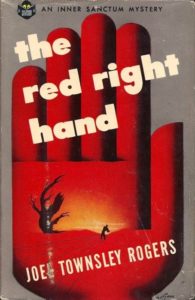
The Red Right Hand by Joel Townsley Rogers
Praised as a classic of the mystery genre that also includes heaps of terror and horror, 1945’s The Red Right Hand is about a young couple on their way to be married, an ominous hitchhiker, and a mysterious accident in which both husband-to-be and hitchhiker disappear—leaving behind somebody’s severed right hand. According to the great Donald Westlake: “I believe Joel Townsley Rogers’ The Red Right Hand should be reissued every five years forever.”
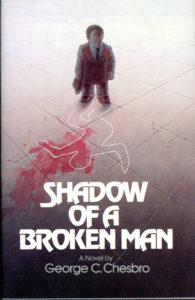
Shadow of a Broken Man by George C. Chesbro
This 1977 novel introduced Dr. Robert Frederickson, a.k.a. Mongo the Magnificent, a detective in New York City, hired by the widow of a famous architect to find out if her husband is really dead. Frederickson is also a former circus headliner, a black belt karate expert, a renowned criminologist, a private detective extraordinaire, and a dwarf—and he went on to star in more than a dozen acclaimed novels that mixed detective stories with sci-fi and cryptozoology.

Artemis by Andy Weir
Weir’s 2017 follow-up to his hit novel The Martian is a heist story set on a moon colony. Do you really need more? Okay, sure: It follows Jasmine “Jazz” Bashara, a snarky young woman hired to steal something by a wealthy entrepreneur, and she ends up in the middle of a conspiracy for control of the world’s first moon base, which is beset by criminal and political strife.

The Last Policeman by Ben H. Winters
In six months, an asteroid is going to wipe out the planet. But Detective Hank Palace just wants to investigate a suicide he suspects isn’t really a suicide. Not that anyone else cares. The world is about to end! Winters really nails the economic and political minutiae, mixed with the raw humanity of it all. This 2012 novel is the first of a superior trilogy that reinvents the concept of the police procedural in the light of speculative destruction.

Already Dead by Charlie Huston
This 2007 novel is the first installment of a five-part series featuring Joe Pitt, a private investigator who is also a vampire. Pitt is a real bastard, and Huston nails that hardboiled voice, creating something that is devoted to the hardboiled genre and to the New York City setting, but adds in vampire clans (and some other cool monsters) to create something utterly unique.

Disappearance at Devil’s Rock by Paul Tremblay
A teenage boy disappears, and his mother is obsessed with finding out what happened. This could be the start of any number of traditional suspense novels, but Tremblay ups the ante in this 2016 book, with mysterious journal pages, ghostly figures peering through windows, and devilish folklore. It’s a mystery. And a horror novel. Maybe. Depends on what you think of the ending.
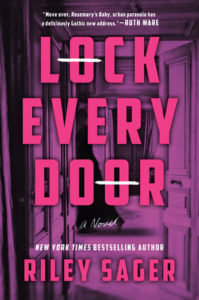
Lock Every Door by Riley Sager
A thriller that teases you with just about every horror genre imaginable, Lock Every Door, which came out last month, follows a young woman who gets a job apartment sitting in the Bartholomew, one of New York’s oldest and most glamourous buildings. The book is dedicated to Ira Levin, which should offer some hints, but Sager hits you with red herring after red herring—until you get to the end, which is more horrifying than you could have imagined.

Dead Until Dark by Charlaine Harris
In the first entry of the Sookie Stackhouse series, published in 2001, a string of murders hit the fictional Louisiana town of Bon Temps. But this isn’t any old gothic murder mystery (with a dash of romance)—it’s set in a world where vampires are real and, thanks to a synthetic blood substitute, are integrating into society. It was the first of 13 novels and gave us the gift that was HBO’s True Blood.
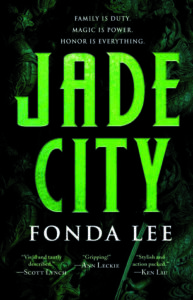
Jade City by Fonda Lee
2017’s Jade City is about clans battling for control of their formerly war-stricken island nation, and the precious jade that gives them the ability perform supernatural feats. It’s a crime drama about gangsters and the drug trade, brought to spectacular new heights by fantasy and martial art elements. Or, as someone more clever than me said, it’s The Godfather with magic.
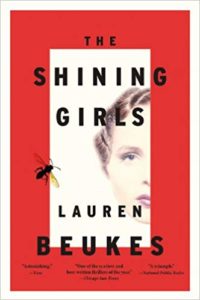
The Shining Girls by Lauren Beukes
This 2014 novel is a new take on the serial killer genre, about a murderer who preys on young woman, but doesn’t travel the land looking for his victims—he travels through time. And eventually he’s pursued by the woman who gets away. It’s a challenging book—in terms of both the violence and the sharpness of the time and narrative shifts—but in the end, you will be rewarded.

















